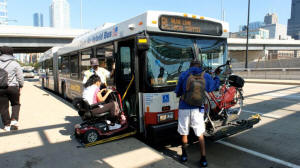|
A number of hearings will take place throughout the coming
months to discuss the state of public transit, ranging from how
it positively impacts Illinois' economic and public health
system to the service improvements that need to take place.
With the Regional Transportation Authority (RTA) currently
facing a $730 million budget shortfall in 2026, Illinois
lawmakers are searching for answers.
The chair of the Illinois Senate Transportation Committee, state
Sen. Ram Villivallam, D-Chicago, said there is business to take
care of before any state funding is discussed or handed out.
“Unless we address service, governance and the corresponding
reforms that are needed to give our residents, the taxpayers in
the RTA region, the confidence that this system will be one that
meets the once-in-a-generation opportunity to recreate a safe,
reliable, accessible, equitable and environmentally conscious
and economically impactful public transportation system," said
Villivallam.
One proposal would create a new entity, the Metropolitan
Mobility Authority (MMA), which would replace the Chicago
Transit Authority, Metra, Pace and the Regional Transportation
Authority. Supporters of the MMA say siloed agencies have long
competed for funding and are not delivering dependable service
to riders. The leaders of the agencies have pushed back at the
merger idea.
Ridership numbers plummeted during the COVID-19 pandemic and
have never recovered. Still, Kirk Dillard, chairman of the RTA
board of directors, said public transit plays a key role in the
Illinois economy.
“The RTA service area represents 74% of all the economic
activity in Illinois, and the system has enormous economic
impacts despite being underfunded for decades,” said Dillard.
Several more hearings on the matter will take place in the
coming months, with the next one slated for July 24.
“These hearings will serve as a place for these conversations to
occur, and ensure we are working toward the common goal of
providing safe, reliable, accessible, economically impactful and
environmentally conscious transportation for all,” said
Villivallam.

|
|





